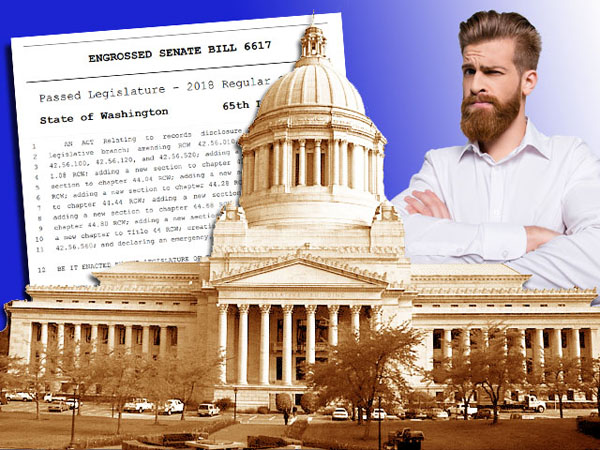OPINION
By ignoring process, ’emergency’ disclosure bill promotes cynicism
By NICK LICATA
(Feb. 28, 2018) — When I speak before groups, I say that the biggest danger we face in sustaining our democracy is cynicism, the belief that government is corrupt beyond repair. That belief sucks away our energy to challenge those in power to be accountable to the general public. Corruption can be old-fashioned; public officials taking bribes to vote a certain way. But corruption is more often seen as a government that is unresponsive and unaccountable. It often stems from a feeling that someone or some group is getting away with something, and no one is going to call them on the carpet.
 That feeling was stoked last week when both houses of the Washington State Legislature, with more than two-thirds approval, passed a law so that members of the Legislature do not have to adhere to the state Public Records Act. It wasn’t just that they passed the law, but they did so as an emergency act in less than a week, and as such the law cannot be overturned by an initiative of the people.
That feeling was stoked last week when both houses of the Washington State Legislature, with more than two-thirds approval, passed a law so that members of the Legislature do not have to adhere to the state Public Records Act. It wasn’t just that they passed the law, but they did so as an emergency act in less than a week, and as such the law cannot be overturned by an initiative of the people.
First, let me provide a little background, and then I’ll illustrate why some of the wisest public servants in our state failed to follow three simple steps of how to organize citizens to their cause.
A lawsuit was filed back in September by the major newspapers and TV stations in Washington state against the Legislature. It accused them of violating the state public records laws because they refused to turn over calendars, e-mails, and texts related to state business. Then in January, Thurston County Superior Court Judge Chris Lanese ruled that the records of individual state lawmakers were subject to public disclosure, just as local government officials and state agencies currently are.
In response, lawyers for the House and Senate appealed the decision, arguing that a 1995 revision to a 1971 definition of legislative records was not subject to Initiative I-276, which passed overwhelmingly in 1972 giving “full access to public records… so as to assure that the public interest will be fully protected.”
This is where the story takes a sharp turn to the right. Apparently, the prospects for a reversal of the judge’s decision didn’t look too good. And with the Legislature having a short session with lots to do, if the court’s ruling was to stand, the legislators feared that their staff could be overwhelmed with paperwork trying to meet the many requests to turn over their emails and other records.
So, it occurred to them that they could fix this problem by changing the law, which would be perfectly legal. Given their tight timeline, they declared it an emergency piece of legislation and rushed through a vote in a few days without the usual public hearing. It reminded me of what the Legislature did many years ago when they overturned another citizen initiative that would have stopped a half-billion dollars in public funding for a privately run sports stadium.
 It is easy to just say that the legislators are either being pig-headed or have something to hide, but in their defense they actually have some real concerns. In response to a letter from League of Women activist, Nora Leech, Sen. Jamie Pedersen (D-Seattle) replied with a detailed and logical explanation of why he voted in favor of the legislation. Now, one could find fault with his arguments, but what is critical here is that there was some rationale for his position. This brings me to what went wrong.
It is easy to just say that the legislators are either being pig-headed or have something to hide, but in their defense they actually have some real concerns. In response to a letter from League of Women activist, Nora Leech, Sen. Jamie Pedersen (D-Seattle) replied with a detailed and logical explanation of why he voted in favor of the legislation. Now, one could find fault with his arguments, but what is critical here is that there was some rationale for his position. This brings me to what went wrong.
Putting aside whether the bill should have been introduced at all, the biggest error that the legislators made was not seeing citizens as potential partners in helping them address their concerns. They made a classic mistake of ascribing more importance to facts than process, and thus both Democrats and Republicans can be seen as elitist and not populist. In other words, if public officials believe that they have a better solution than what may appear to be a common sense one, the burden is on them to do three things.
First, they should have focused on the process of how that decision was going to be reached, rather than assuming that since it was a better solution, everyone would eventually see it their way. In fact, the public may eventually come around, but in the short run, the anger that is generated could well oust a politician from office. Process overshadows the facts, because no one will listen to the facts if they believe they aren’t being listened to. Having the emergency bill was unnecessary and counterproductive.
Second, plan ahead and involve allies in that effort. There was no need for an emergency bill in this instance. The lawsuit was filed long before the session began. Didn’t legislators consider that they might not get a favorable ruling in court? And even when they didn’t receive one, they still had close to a month to properly go through a public hearing process.
If they had been prepared, they could have released material similar to what Sen. Pederson did and approach organizations that they are used to working with to be involved in reviewing their proposed law. The bill that passed does provide public access to legislators’ calendars and letters and e-mails from lobbyists. None had been public before. Certainly they could have provided even more access if there were accommodations made to protect constituent privacy concerns to be safe from predators.
Third, they needed to listen to those groups and individuals who were most critical of their current practice of limiting access to their records. This was an issue that clearly was on the horizon before the session began. If discussion groups had been taking place, it would have helped the legislators better prepare their own arguments for why they needed to be treated like the judiciary, which also has its own set of rules. With knowledge gained from those talks, legislators might have been able to win over some of the media outlets; instead their blunt approach only succeeded in solidifying the opposition.
There is still hope. Every law can be rewritten, even emergency laws. A minority of legislators, who were from both parties, did not support the bill. They, along with some who voted in favor of the bill, could provide a bridge to the general public in soliciting suggestions before next year’s session begins. They could hold working meetings with legislators to improve public access to legislators’ records. And through that effort, help our citizens overcome some cynicism in how our democratic process works.
 Nick Licata was elected to five terms on the Seattle City Council before leaving office at the end of 2015 to pursue helping citizens influence government policies. This column, originally published at Urban Politics, is posted here with the author’s permission.
Nick Licata was elected to five terms on the Seattle City Council before leaving office at the end of 2015 to pursue helping citizens influence government policies. This column, originally published at Urban Politics, is posted here with the author’s permission.





